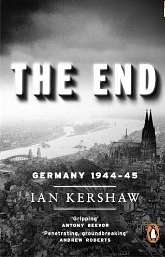The End

Editorial Penguin UK
Fecha de edición abril 2012 · Edición nº 1
Idioma inglés
EAN 9780141014210
Libro
encuadernado en tapa blanda
Resumen del libro
The last months of the Second World War were a nightmarish time to be alive.Unimaginable levels of violence destroyed entire cities. Millions died or were dispossessed. By all kinds of criteria it was the end: the end of the Third Reich and its terrible empire but also, increasingly, it seemed to be the end of European civilization itself. In his gripping, revelatory new book Ian Kershaw describes these final months, from the failed attempt to assassinate Hitler in July 1944 to the German surrender in May 1945. The major question that Kershaw attempts to answer is: what made Germany keep on fighting? In almost every major war there has come a point where defeat has loomed for one side and its rulers have cut a deal with the victors, if only in an attempt to save their own skins. In Hitler's Germany, nothing of this kind happened: in the end the regime had to be stamped out town by town with a level of brutality almost without precedent.
Biografía del autor
Sir Ian Kershaw es catedrático de Historia Moderna en la Universidad de Sheffield. Es autor de Hitler. La biografía definitiva (Península, 2010), la monumental biografía best seller del dictador, originalmente publicada en dos tomos (años 2000 y 2005), que fue seleccionada para el Premio de Biografía Whitbread de 1998, recibió el primer Premio Samuel Johnson de Ensayo, el Premio Literario Wolfson de Historia, el Premio Bruno Kreisky de Austria para el libro político del año, se le concedió conjuntamente el premio inaugural de la Academia Británica y fue seleccionada para el Premio de Biografía Whitbread del año 2000. Es autor de Un amigo de Hitler (Península, 2006) que ganó el Elizabeth Longford Prize de Biografía Histórica, Decisiones trascendentales (Península, 2008), El mito de Hitler (Crítica, 2012), El final. Alemania 1944-1945 (Península, 2013), Descenso a los infiernos. Europa 1914-1949 (Crítica, 2016), Ascenso y crisis. Europa 1950-2017: un camino incierto (Crítica, 2019) y Personalidad y poder (Crítica, 2022).








